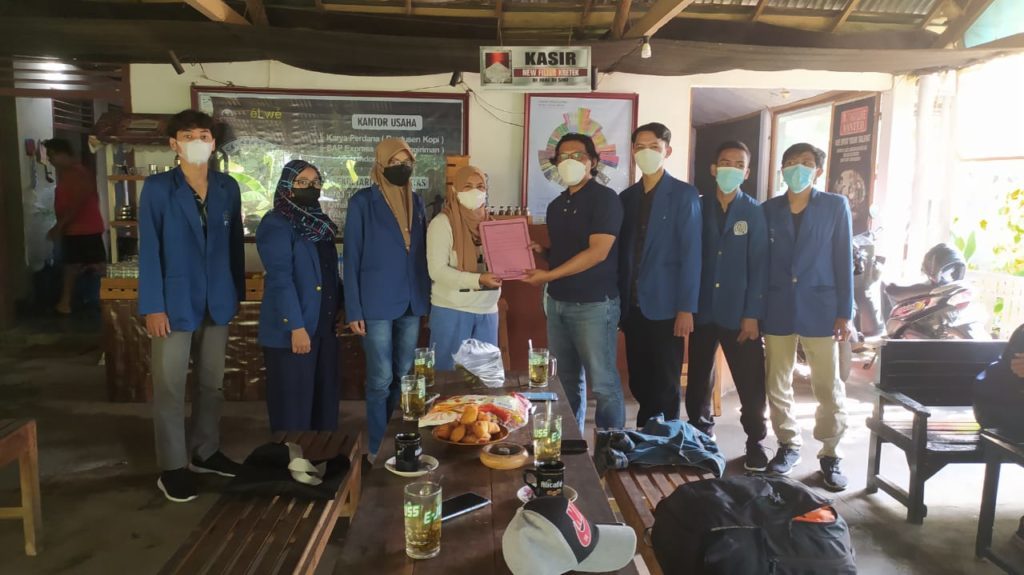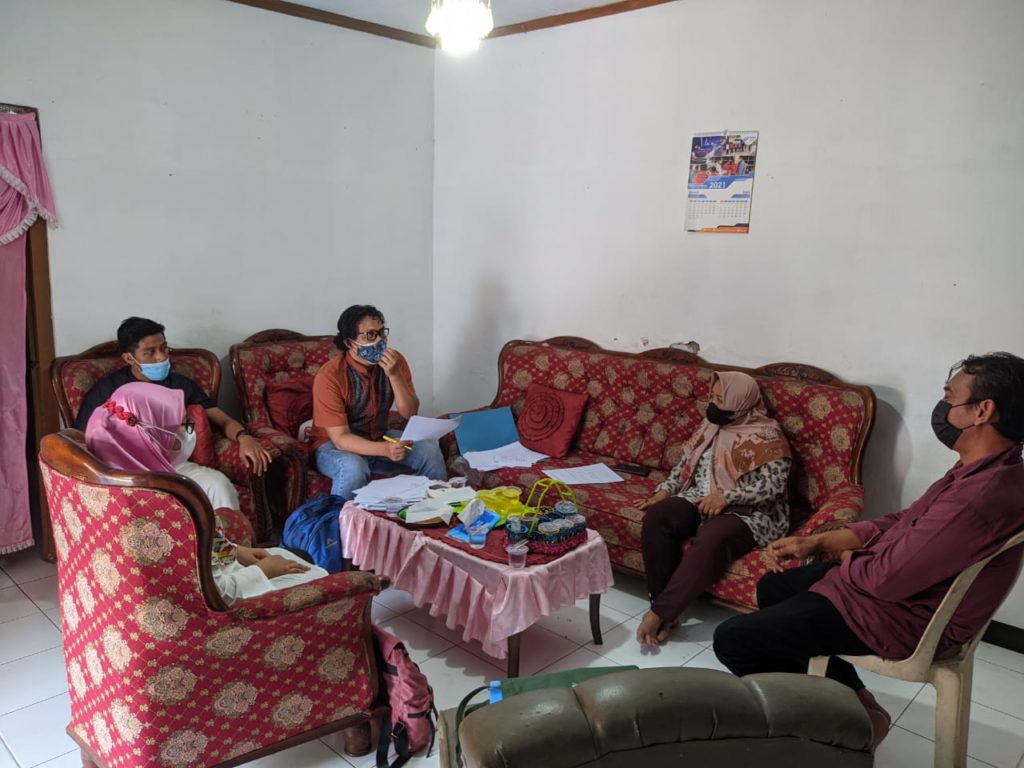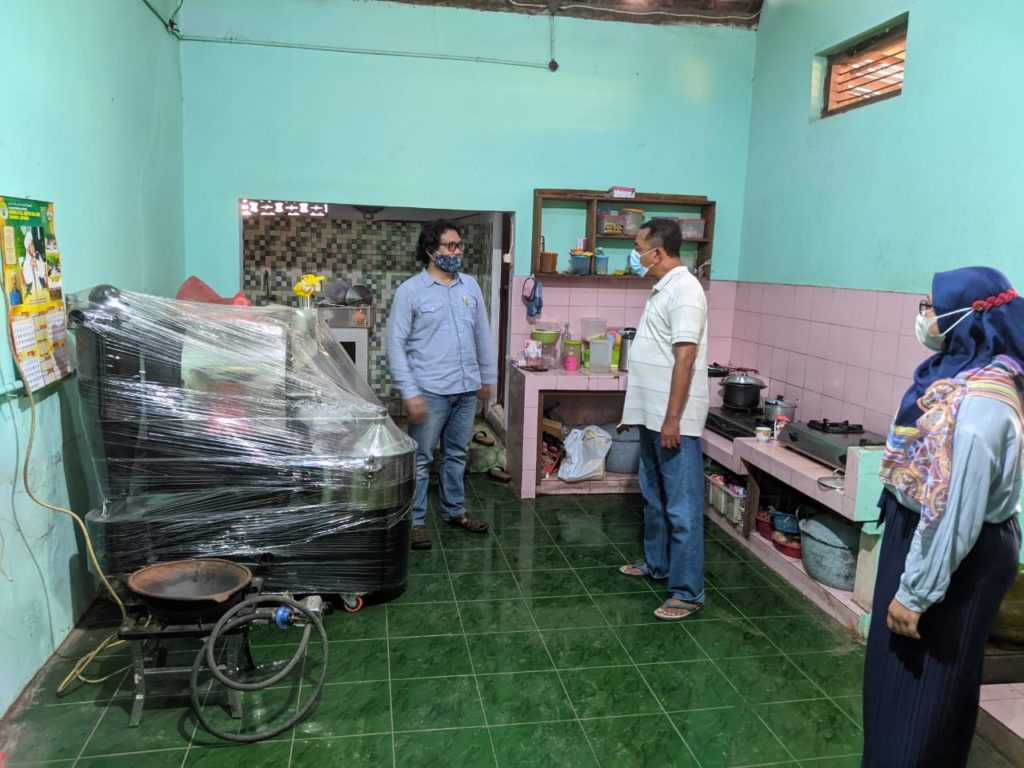ITS KKN Team Invites MSMEs to Care about Halal Certification

Dr rer nat Nasori SSi MSi with the 2021 Abmas Halal KKN Team when submitting a halal certification registration document to one of the selected MSME actors
ITS Campus, ITS News – As one of the effective strategies to encourage economic improvement in the halal industry, the government, through the Halal Product Assurance Administration Agency (BPJPH), has changed the nature of halal certification from voluntary to mandatory. Reflecting on these problems, the Institut Teknologi Sepuluh November (ITS) has played an active role by providing halal assistance to Micro, Small, and Medium Enterprises (MSMEs) through Real Work Lectures and Community Service (KKN Abmas), which have been gradually implemented since 2015. 2020.
As the advisor for the 2021 Abmas Halal KKN, Dr rer nat Nasori SSi MSi revealed that one of the efforts to achieve progress in the halal industry is to increase the selling value of products from MSMEs in Indonesia. The selling value of this product, according to him, is getting better if a business has been officially labeled halal by obtaining halal certification from the Institute for the Study of Food, Drugs, and Cosmetics, the Indonesian Ulema Council (LPPOM MUI). “The problem is, there are still many MSMEs who do not care about halal certification,” he said concernedly.
Responding to these problems, the ITS Halal Study Center, in collaboration with the East Java Cooperatives and MSMEs Service, conducted training and socialization on halal certification to MSMEs in East Java. Then, said Nasori, the program was continued with implementing KKN Abmas halal assistance by ITS students to selected MSMEs. “ITS invites students to take part in the field and be directly involved with MSMEs,” he said.
Dr rer nat Nasori SSi MSi (left) while conducting coaching to one of the selected MSMEs
Nasori said that more than 500 MSMEs initially attended the socialization of halal certification. Then, considering the existing resources and the long mentoring process, 20 MSMEs were selected to be fostered to obtain halal certification. This Physics Department lecturer said that the selected MSMEs came from various regions in East Java, including Gresik, Sidoarjo, Mojokerto, Jombang, Ponorogo, and others.
Regarding implementing his assistance, this lecturer from the ITS Faculty of Science and Data Analytics (FSAD) explained that the process carried out tends to be directed at MSMEs to complete the required documents for halal certification registration. The rest, according to Nasori, is in the form of mechanical directions, namely the procedures for registering and collecting these documents through online media.
This ITS Postgraduate alumnus continued. The following certification stage was a direct survey by LPPOM auditors to related MSMEs. Then the issuance of a halal fatwa by LPPOM MUI and turning to BPJPH as the final stage.
Despite going through a relatively long process, Nasori believes that implementing the Abmas Halal KKN has brought many benefits. In addition to helping the government advance the halal industry in Indonesia, students as KKN implementers also have a positive impact, namely increasing knowledge in entrepreneurship. Consumers, especially adherents of Islam, also get peace with the guarantee that the products distributed in the community have been proven to be halal and suitable.

Dr rer nat Nasori SSi MSi with representatives of the 2021 Abmas Halal KKN Team when providing assistance to one of the selected MSMEs
Next, as a target for KKN, MSME actors have the opportunity to increase the selling value of their products so that the options for these products to compete in the national and global arena are increasingly open. “Halal certification must be met to help develop its products to a larger scale,” he said.
Although still focusing on East Java Province, Nasori hopes that ITS, through the Center for Halal Studies and Halal Mobilization Cadres, will continue to continue the halal mentoring program initiated and even expand it at the national level. He also hopes that students will start to see the field of entrepreneurship as a field of sustenance so that in the future, students are no longer oriented to looking for work but also to create jobs.
Furthermore, this Alumnus of Technische Universität Ilmenau, Germany, advised students to be more concerned with the surrounding community. One of them is by socializing that halal certification is an obligation.
Especially continued Nasori; currently, obtaining halal certification has been easier with the process, which can now be done online. The validity period of the halal certification is extended from two years to four years. “Well, with that convenience, let’s socialize it to the public so that they are more concerned with halal certification,” he concluded. (ITS Public Relation)
Reporter: Zanubiya Arifah Khofsoh
Related News
-
ITS Collaboration with BPBD East Java, Launching VR Disaster Simulation
ITS Campus, ITS News — Supporting anticipation of disasters and continuing to educate the public, Institut Teknologi Sepuluh Nopember
November 18, 2021 19:11 -
Supporting the Implementation of Innovative Ideas, ITS and IYSA Hold International Competition
ITS Campus, ITS News — Institut Teknologi Sepuluh Nopember (ITS) has once again proven its commitment to supporting the
November 18, 2021 19:11 -
ITS Maintains Informative Qualification for Five Consecutive Years at KIP Awards
ITS Campus, ITS News — Institut Teknologi Sepuluh Nopember (ITS) has once again successfully maintained its Informative Qualification predicate
November 18, 2021 19:11 -
ITS Strengthens Smart Eco-Campus through UI GreenMetric 2024
ITS Campus, ITS News — Institut Teknologi Sepuluh Nopember (ITS) has once again demonstrated its commitment to environmental concern
November 18, 2021 19:11

